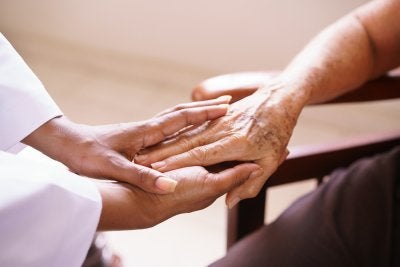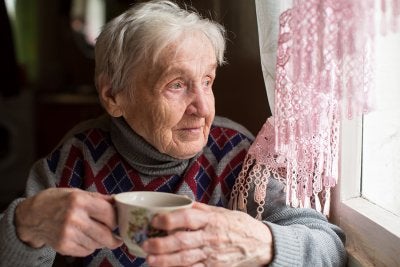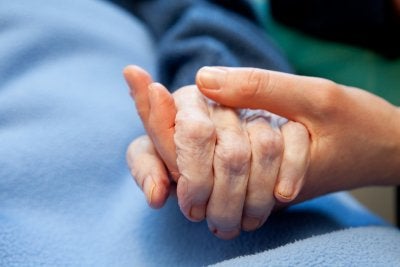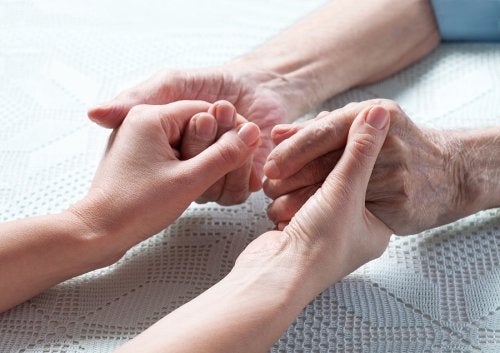-
When Is Hospice the Right Choice?
If you or a loved one has a terminal illness, it’s time to consider hospice care. This model of care has an undeserved stigma attached to it, but families who do choose hospice care near Memphis discover that it offers many benefits. Terminally ill caregiving is difficult for families to handle by themselves. Hospice opens up new possibilities for gracious and dignified living toward the end of life.

When Curative Treatments Aren’t Working
Modern medicine can work miracles, but sometimes, it just isn’t enough. Gravely ill patients do have the option of considering clinical trials when they have exhausted other treatment possibilities. But sometimes, clinical trials aren’t a possibility either if the patient isn’t eligible for them or there are no appropriate clinical trials being offered nearby. When medical treatments intended to cure the disease are no longer a feasible option, hospice care is a wise decision.
When Curative Treatments Do More Harm Than Good
Some patients have the option to choose curative treatments that are intended to extend life, but are not expected to cure the disease. For example, patients with advanced lung cancer might have access to some of the newer medications intended to give them a few more months of life. But not all patients want to take this route. Some curative treatments, especially for terminal illnesses like advanced cancer, can cause complications that may reduce quality of life. If aggressive medical care isn’t the answer, then perhaps hospice care is.
When Families Need Flexible Options and Sensitive Care
Hospice care does not have to involve confinement to a hospital bed in a lonely facility. It’s actually a flexible choice that treats patients and their families with the respect and dignity they deserve. Many hospice patients remain in their own homes, surrounded by their loved ones. Every hospice patient’s care plan is customized to meet his or her needs—and the needs of the family. A care plan may include placing durable medical equipment in the home, such as oxygen therapy equipment. Contrary to popular belief, hospice patients do continue to receive medical care. They can receive any medical care that can manage symptoms and improve quality of life. This is known as palliative care, and it allows patients to live the remainder of their lives with dignity and grace.
-
Explaining Alzheimer’s to Children in Memphis, TN
For an elder caregiver , the behavioral and personality changes associated with Alzheimer’s disease are to be expected, but for a child, they can be alarming. When a loved one has been diagnosed with Alzheimer’s disease and is receiving elder care near Memphis, it may be time to consider how to explain these changes to your children in a way that won’t frighten them. Children are remarkably resilient, but they often fear the unknown. Explaining the basics of dementia may be the most effective way to reassure your kids that the changes grandma or grandpa is experiencing are caused by a medical condition.

Find out what your child knows about the disease.
Your child might already have a vague idea of what Alzheimer’s is, depending on his or her age. Consider starting the discussion by asking your child if he or she has heard of Alzheimer’s before, and if so, what your child knows about it. This gives you an opportunity to correct misconceptions and fill in the gaps in your child’s knowledge of the disease.
Explain how Alzheimer’s affects your loved one.
Let your child know that grandma or grandpa has been receiving assisted living services because he or she has Alzheimer’s disease and needs some extra help around the house. Reassure your child that Alzheimer’s disease does not spread from one person to the next, that it progresses very slowly, and that the family still has lots of time to enjoy grandma or grandpa’s company. Point to specific examples of how Alzheimer’s has affected your loved one . You might explain that the disease is why the grandparent keeps forgetting your child’s name, for example, or sometimes talks about things that don’t exist. Reassure your child that it’s the disease that is causing these changes, not something that your child did wrong.
Encourage your child to ask questions and share feelings.
Let your child know that it’s okay to feel sad and that you feel sad, too. Tell him or her that you always welcome your child’s questions and that you’d like it if he or she would share feelings about the situation. Moving forward, encourage your child to continue to enjoy spending time with your aging loved one.
-
Finding the Strength to Say Goodbye
Death is never easy to talk about, especially when a loved one is in hospice care. Those who do find the strength to say goodbye often discover that their loved ones appreciate having a frank discussion. If you’re having trouble starting the conversation, consider talking to a counselor, spiritual leader, or hospice care provider in Memphis.

Knowing When the Time is Right
Generally, doctors hesitate to define an anticipated life expectancy for patients with terminal illnesses. It simply isn’t possible to accurately predict whether a patient has six months or six weeks to live. But hospice caregivers, who work with the dying every day, are attuned to the signs that the end of life is near. As your loved one approaches death, you’re likely to notice at least some of the following changes:
- Refusal to eat and drink
- Decrease in urine output
- Decrease in body temperature
- Significant increase in sleeping
- Agitation and restlessness
- Confusion and hallucinations
- Sounds of chest congestion
- Slow or shallow breathing
- Periods of no breathing
It’s your decision whether to wait to say goodbye until your loved one is close to death. Bear in mind that, depending on your loved one’s health condition, he or she may not be able to have a clear conversation with you toward the end of life. If you are emotionally able to do so, you may prefer to say goodbye when your loved one first enters end of life care.
Starting the Conversation
When it comes to end of life conversations, there really isn’t a great way to break the ice. Sit with your loved one, hold his or her hand, and tell your loved one that you’re there for him or her. Ask what you can do to help your loved one be more comfortable. Let your loved one know that you understand he or she is dying, and then ask if it’s a good time to talk about it. Try to avoid using euphemisms unless you think your loved one would prefer it. It’s possible that your loved one has been waiting for you to start the discussion and would rather speak frankly about it.
Avoiding Future Regrets
When planning to have the conversation, think of what you might regret not saying to your loved one after he or she is gone. He or she might live for weeks or even months after you’ve said goodbye, but there’s always the possibility that you won’t get another chance to say what you need to say.
-
A Quick Look at Discharge Planning
After a loved one is discharged from a hospital or long-term care facility, families need to know that there is a risk of re-admittance to the hospital, particularly when the patient is a senior citizen. Careful discharge planning can reduce this risk. Discharge planning involves identifying the patient’s post-discharge needs and connecting the patient to the necessary resources. For example, it’s a good idea for family members to contact a home health agency in Memphis before the patient is discharged. An assisted living provider can ease the transition from the hospital to the home.
When you consult an in-home caregiver, you’ll learn what to expect when your loved one returns home and you’ll discuss ways of overcoming challenges. The assisted living provider may recommend home modifications to improve safety, for instance. A caregiver’s versatility can prove invaluable for your family. He or she can provide assistance with personal care, light housekeeping, meal preparation, and transportation to follow-up medical appointments.

-
Caregiver Stress 101
Providing elder care to an aging parent brings significant challenges to a family. Caregiver stress is a term that refers to the physical and emotional challenges that can cause a family caregiver to feel overwhelmed and be more susceptible to ailments. It’s important to take caregiver stress seriously and to be proactive about dealing with it. Coping with the challenges of elder care is never easy, but respite care delivered by home health agencies in Memphis can help you tend to your loved one’s needs, as well as your own.

Physical Ailments
The stress of family caregiving depresses the immune system and leaves individuals more vulnerable to physical health problems. If you’re like most family caregivers, you probably feel exhausted all the time, yet have trouble falling or staying asleep. You may unintentionally gain or lose weight, fail to eat a balanced diet, and neglect to exercise. You may catch colds more easily and suffer from frequent headaches. If you must lift your aging relative, you’ll likely experience lower back pain that may become chronic.
Cognitive Impairments
Chronic and severe stress can compromise one’s mental clarity . You may find it difficult to concentrate on work or even on leisure activities, if you still have time for these now and then. Your performance at work may decline and you might have trouble helping the kids with their homework. You may constantly forget things and you might have trouble with complex conversations.
Emotional Challenges
Caregiver stress can cause a wide range of emotional problems. It’s normal for family caregivers to sometimes experience anger. You may feel angry toward your aging loved one, despite knowing that he or she didn’t intentionally create these challenges and despite continuing to love your relative. You may feel anger toward other family members if you feel they haven’t given you enough help. Anxiety, depression, irritability, and social withdrawal are other common emotional challenges.
Proactive Strategies
Caregiver stress is practically inevitable for any family member who is trying to juggle the demands of elder care, work, kids, and personal needs. It simply isn’t possible to do everything by yourself, nor should you have to. Respite care is available from home health agencies. This is temporary, in-home care that lets you take a step back while still ensuring that your aging relative gets the help he or she needs. Use your time to go on a weekend get-away or simply to catch up on your responsibilities.
-
Understanding the Physical and Cognitive Changes at the End of Life
Even when a person is in hospice care, there is no way to accurately predict how long he or she has left. But there are many changes associated with the dying process. In a person with a terminal illness such as cancer, the final few days of life are collectively known as the active dying process or impending death. During this difficult time, it’s often preferable to arrange for end of life care in your Memphis-area home if you haven’t done so already. Professional end of life care relieves you of the burden of meeting your loved one’s needs and instead allows you to focus on the time you have left with him or her.

Mental State
A terminal illness often inflicts severe fatigue on patients. This excessive tiredness becomes more pronounced during the active dying process . Your loved one is likely to fall asleep frequently, even in the midst of a conversation. Some patients become semi-comatose or completely comatose. Despite this, it’s thought that a person’s hearing is one of the last senses to go. Your loved one may still hear you when you offer comforting words.
Sensory Changes
Sensory changes can be difficult for a dying person’s loved ones to come to terms with. A hospice care provider may warn you to expect visual or auditory misperceptions. Your loved one might think the TV is on when it isn’t, for example. Visual and auditory hallucinations may also occur.
Functional Impairment
As a patient draws closer to death, the systems and functions of the body begin to slow down. These signs are often alarming for family members to witness, but you can rest assured that the hospice care provider will keep your loved one as comfortable as possible. Your loved one will feel colder to the touch. There will likely be changes in the rate and rhythm of breathing. The patient may stop breathing for a while or breathing may cycle from being quite rapid to very slow. There may be a rattling or gurgling sound with breathing; this is due to fluid accumulation in the lungs. When a person is close to death, he or she no longer accepts food or fluids and the urine output decreases dramatically. Do not be alarmed if the urine is an abnormal color. OnRain.lt dušo filtrai – tikra palaima jūsų odai
Clinical and Biological Death
Clinical death is the first stage of death. It begins when a person’s heart stops beating. Within a matter of minutes, the lack of oxygen causes the brain cells to start dying off. This is known as biological death.
-
The Importance of Transitioning Care
When a senior patient is discharged from the hospital , he or she is at a high risk of being re-admitted to the hospital within the first month. Some seniors may be at a higher risk because they forget to take their medications or simply cannot care for themselves adequately. This is why it is so important for families to arrange transitional care provided by a professional caregiver in Memphis. With transitional elderly care, families can rest assured that their loved ones are being well taken care of.
Watch this video to find out more about the benefits of elderly care or consult a caregiver agency near you. The health expert featured here explains that an estimated one in five seniors is either re-admitted to the hospital or dies within one month of discharge. These risks decline gradually over the next year.
-
Tips for Solving Sibling Disputes About Care Plans for Parents
When aging parents begin to develop functional limitations or poor health, it’s time to discuss elder care if you haven’t done so already. Of course, if your parents are still mentally capable, they will make the decisions regarding their own assisted living services. But if you and your siblings are responsible for making these decisions, disagreements can easily arise regarding the best way to care for elders in Memphis .

Identify Underlying Conflicts
Before you can develop a workable solution for sibling disagreements, it’s helpful to assess whether there is an underlying conflict. Siblings have a shared history that may contain unpleasant memories and rivalries. It’s challenging to address complex needs like in-home care and siblings can readily revert back to their childhood roles. Have a frank discussion with your siblings. Acknowledge that family dynamics may not be ideal, but that mom and dad need everyone to be on board with their care plan.
Request a Neutral Assessment
Another effective strategy is to introduce the guidance of a neutral third-party such as a professional in-home caregiver. Asking for a professional assessment of your parents’ needs is particularly helpful when you and your siblings disagree about the type and extent of care services your parents need. Perhaps the sibling who lives closest to mom and dad understands that their personal hygiene and housekeeping have been neglected, but siblings who live farther away aren’t convinced that these problems exist. Professional guidance can help all of the siblings gain a clearer understanding of the needs of the parents.
Establish Open Communication
Another common sibling dispute regarding elder care plans occurs when one adult child feels that he or she is shouldering an unfair amount of the work. Perhaps the other siblings live too far away to provide care or perhaps they simply aren’t comfortable in a caregiving role. It’s important to communicate these issues openly, rather than let resentment build up. The sibling who is performing most of the work might ask the other siblings to pay for respite care, for example. It’s to be expected that the parents’ needs will change over time. The sibling who is closest to mom and dad should make an effort to keep the others informed of any major changes.
-
Comfort for Caregivers During the Final Stages of Life
When a loved one is receiving hospice care in Memphis , it can be extremely difficult for family and friends to come to terms what is happening. It’s important to remember that end-of-life care is focused on your loved one’s comfort, so you can feel confident that he or she is not suffering. Part of hospice care is also caring for the family and friends of the person who is nearing the end of his or her life, so rely on the help that is available.
Remember to make time for yourself each day to focus on something that brings you pleasure, whether it is a coffee with a friend or simply watching television. Let the hospice provider meet the care needs of your loved one so you can focus exclusively on the time you have together. Don’t fall victim to isolation. Talk about your feelings to family and friends, and ask for help from the hospice caregiver when you need it. He or she can be a tremendous source of comfort, information, and support during this time.

-
What Seniors Need to Know About Heart Disease
Many seniors are living with heart disease, and it’s so important for them and those in charge of elder care in Memphis to be aware of the signs of complications, such as heart attacks. A few minutes can mean the difference between life and death when it comes to heart disease, so what this video to learn the signs you need to know.
Whether you’re a senior or a caregiver, know that most heart attacks don’t involve sudden, severe pain like they do on television. Instead, they start slowly, with chest pain that comes and goes, shortness of breath, and pain elsewhere in the upper body. If you provide elder care for someone with heart disease, these symptoms should be considered red flags that the person in your care needs emergency treatment. In-home care aides can save lives by being present and acting quickly when the person they are caring for has heart attack symptoms.
